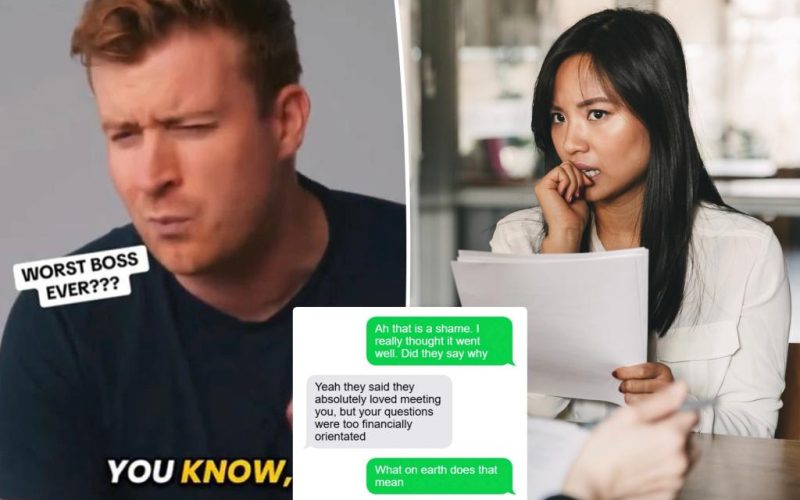A viral text message exchange has exposed the huge taboo around discussing your salary, even with a prospective boss.
Workplace commentator Ben Askins runs a successful TikTok account solely dedicated to calling out “toxic” bosses and companies.
People anonymously submit their workplace experiences, and Askins shares his opinion on them.
Often, the clips ignite big conversations.
Askins has gone viral again for sharing the reason a woman named Katherine didn’t get a job.
The message exchange between Katherine and her recruiter reveals how being upfront about salary can cost workers opportunities.
“Hey Katherine, just tried to call you! I am sorry to say you didn’t get the job. I just heard from them,” the message reads.
“Ah that is a shame. I really thought it went well. Did they say why?” Katherine replied.
“Yeah they said they absolutely loved meeting you, but your questions were too financially orientated,” the recruiter explained.
“What on earth does that mean?” Katherine fired back.
“Apparently you asked about money a lot? Is that true?”, the recruiter questioned.
“You are joking! Is this for real? I asked a couple of questions at the end as I wanted to clarify something around what was included in the benefits package,” she said.
“But for the rest of the interview all my questions were about the role itself.”
“Well it seemed to jar. They said they are looking for someone who is more interested in the role rather than all about the money,” the recruiter fired back.
Askins found the entire text message exchange “ludicrous” because while it’s important to find work that you enjoy, money is the primary reason people need a job.
“I hate that she’s trying to defend herself because there’s nothing to defend,” he said.
“It is a job interview, of course people are going to be interested in the price and package that comes with it. That is the sole reason the person is in that room.”
Askins argued that the main reason people go to work is to “get money”, and it’s natural that you ask that question when being interviewed.
“The idea that you can’t ask a basic question in an interview is so frustrating,” he said.
People online had a similar reaction.
“Why do employers want people to pretend we work for fun?”, one asked.
“To me if they refuse to talk about money it’s a major red flag for a company,” another explained.
“I think she dodged a bullet there. You don’t want to work for a place that has that sort of mentality,” one person argued.
But others agreed it was a dangerous topic to bring up.
“I know this is an unpopular opinion but the interviewer was right – the financial questions shouldn’t be asked in the interview,” someone else argued.
“Unfortunately this is a thing that’s been around for years. I’m 47 and I remember clearly being told not to talk about the wages in job interviews because ‘it’s crass’ to talk about money,” one shared.
Drobot Dean – stock.adobe.com
Workplace expert Roxanne Calder said talking about a salary is important when you’re going through the interview process because no one wants their time wasted but how you approach money is super important.
“It is okay to talk about salary. We should, everyone needs to pay the bills,” she told news.com.au.
“You have to get the timing right. Money does muddy the waters.”
Calder advised that you want to “sandwich” any conversation about money, so ask a question about the role, than a question about salary and then another question about the role.
You want to prove to the interviewer that you’re not solely money-oriented and that you’re passionate about the role, she explained.
Calder said you also want to be “soft” in your approach to salary. She claimed that the company should bring up money, but if they fail to do that, you need to ask politely.
“It needs to be said in a humble and nice way. I’d do it at the end of the interview. I’m really grateful for the interview. ‘Would you mind me asking a quick question?’” she said.
“It shouldn’t be the first question. You want to ask it in a way that people can see your softer side and so you’re not seen to be greedy or difficult.”
Calder said that because of job salary filters on advertisement platforms, sometimes a salary will be listed between $100,000 and $120,000, and if you’re interested in snagging the upper end of the salary estimate, you need to play the long game.
She said often, the person interviewing will want to pay the lower end of the salary estimate, and if you bring up money straightaway, it can be off-putting and mean you get crossed out automatically.
Calder advised that sometimes a company needs to interview a few people before coming to the conclusion that if you want the best worker they’ll need to pay more.
“Once they all do all the interviews, the person will start to see that the person who will take the role for $100,000 might not be as good as the person who would need $120,000 to take the role,” she said.








